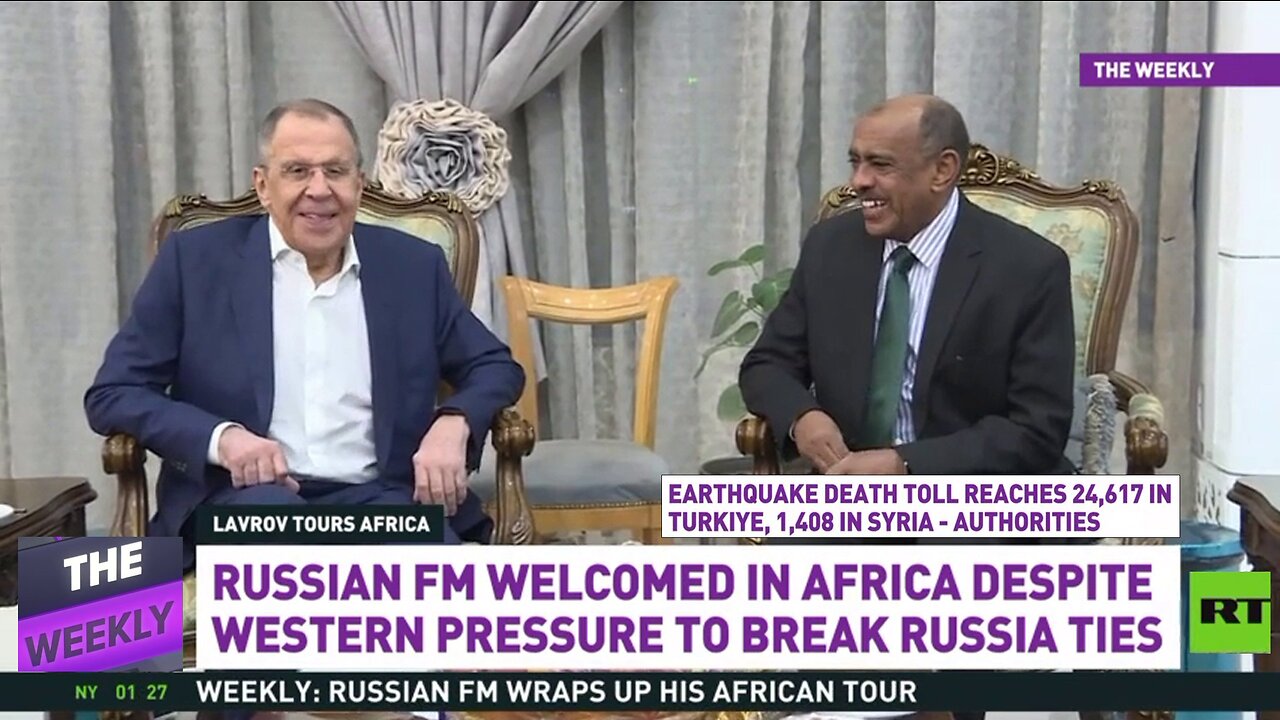Premium Only Content

RT News - February 12th 2023 - The Weekly
Donbass, Donetsk: An RT crew reports from the scene of the latest shelling of Donetsk City that killed one civilian, leaving at least three more wounded, getting caught in the bombardment while filming. In terrorist style, the Ukrainians are waiting for emergency services to arrive and fire again. (QS NB HIMARS rockets are very precise; these are no accidents. See post below (i) If the Ukraine troops were to use their $100,000 a time HIMARS rockets for combat as intended and not for the constant bombing of civilian's homes in the residential only areas of Donetsk and Lugansk, villages, towns and city centres they would have had enough to last years. This applies to the plethora of other shells and rockets supplied by NATO as well)
-
Press "see more" for extended related background and related news articles, which also posted on each archive throughout the week where possible.
-
Canada: An unidentified object spotted over Canada is shot down by the US air force. That's amid tensions simmering between Washington and China over its weather balloon crossing US borders.
-
Over 25 thousand are confirmed dead after catastrophic earthquakes hit Türkiye and Syria, as the death toll continues to rise and both countries struggle to cope with the fallout. Unbelievably, USA and allies are blaming Russia for the delay in sending aid.
-
Nord Stream 2 Sabotage. Marina Kosareva presents the findings of Seymour Hersh and asks "why are the western press so quiet" about this act of terrorism by the NATO bloc. Lionel also comments. A bombshell report by an American award-winning journalist uncovers US involvement in the Nord Stream gas pipelines explosion, using NATO drills in the Baltic Sea to cover their tracks. https://seymourhersh.substack.com/p/how-america-took-out-the-nord-stream
-
Africa scheduled tour by FM Lavrov, part 2: Karabo Letlhatlha reports on the weeks meetings with heads of Sudan, Mali and Mauritania.
-
(not on this video post) Pres. Zelensky has dismissed Ruslan Dziuba as deputy commander of the National Guard, by a decree issued by the presidential office. No reasons were given.
-
=========================================
Below, via RT website 1) --- Britain could produce weapons in Ukraine – Telegraph
2) --- UK has secret plans for EU – Bloomberg
3) --- German foreign minister admits blunder
4) --- US shoots down another ‘unidentified object’
5) --- Russia issues warning to US over special ops in Ukraine
5a) --- Pentagon seeking to resume top-secret programs in Ukraine – WaPo
5b) --- US role in Kiev’s artillery warfare identified – media
i) --- Kiev sounds alarm over ammunition
6) --- Brazil wants Russian investment in energy sector – envoy
6b) --- What a Latin American single currency could mean for the US dollar
7) --- India's defence spending reaches a crossroads: Will New Delhi buy Russian or American weapons? - List
8) --- Russia and Iran to boost transactions in national currencies – official
9) --- Revenge of the Chinese ‘spy balloon’: The US takes the scandal global and turns it into a tool OP-ED
10) --- The West thought oil sanctions would cripple Russia, here's why the plan backfired
==========================================
12 Feb, 2023 08:09
1) --- Britain could produce weapons in Ukraine – Telegraph
British defense executives are reportedly worried about being outperformed by German and French rivals
Senior British defense industry officials are discussing the possibility of manufacturing weapons and armored vehicles in Ukraine under a local license, The Telegraph reported on Saturday. Some executives have already visited Kiev to explore options for setting up joint ventures, the newspaper wrote.
According to the report, British manufacturers are concerned that their French and German rivals could be the first to seal a deal with Kiev. One executive was quoted as describing the negotiations as a race to put London “at the front of the queue.” It was also said that such a licensing deal would likely require the approval of the British government.
The news comes as Ukraine’s Western supporters step up their military aid to Kiev amid its armed conflict with Russia. Britain pledged last month to deliver a squadron of Challenger 2 tanks for the first time.
Prime Minister Rishi Sunak, who hosted Ukrainian President Vladimir Zelensky during his unannounced visit to the UK on Wednesday, instructed the Ministry of Defence to study the issue of supplying Kiev with fighter jets. “We take these decisions carefully and we do it thoughtfully. We are aware of potential escalatory risks,” Sunak’s spokesperson said this week.
Moscow has repeatedly warned that “flooding” Ukraine with foreign weapons would only lead to further escalation and that Western arms would be treated as legitimate targets. “These actions will not substantially change the outcome of the conflict,” Kremlin spokesman Dmitry Peskov told reporters on Thursday. He added that military aid to Kiev would only make the conflict “more painful for Ukraine.”
Russia launched a military operation in Ukraine nearly a year ago, citing the need to protect the people of Donbass and Kiev’s failure to implement the 2014-2015 Minsk peace accords.
https://www.rt.com/news/571358-uk-arms-production-ukraine/
=============================================
11 Feb, 2023 20:44
2) --- UK has secret plans for EU – Bloomberg
London is quietly planning to boost cooperation with Brussels in defense, migration and the economy, officials told the agency
British Prime Minister Rishi Sunak has privately asked members of his cabinet to work out ways of rebuilding connections with the EU that had been severed after Brexit in 2020, government sources have told Bloomberg.
Plans are currently being put together at 10 Downing Street to boost ties between London and Brussels in such areas as defense, migration and the economy, including trade, energy and international standards, the agency reported on Saturday.
According to British ministers, diplomats and officials, who all spoke on condition of anonymity, the rapprochement is being prepared in order to compensate for the fallout of the conflict between Russia and Ukraine, in which London positions itself among the prime backers of the Kiev authorities.
In the coming days, Sunak’s government is hoping to announce a solution to the longstanding dispute with the EU over post-Brexit trading arrangements for Northern Ireland. London’s plan is to capitalize on this development and make it the basis for further improving ties with the 27-member bloc.
Bloomberg pointed out that by moving in this direction, the PM is risking causing anger among the anti-EU lawmakers from his ruling Conservative Party. Another challenge for Sunak would be overcoming the skepticism of European leaders, who got tired of top British politicians using the bloc as a "punch bag for their domestic audience" since the Brexit vote in 2016, it added.
One of the sources assured Bloomberg that the alleged turn towards Europe didn’t mean that Brexit was a mistake but was merely a reflection of the changing geopolitical situation.
According to another official, Sunak’s subordinates were able to persuade the Prime Minister, who has been in office since late October, that in the current reality of "a more dangerous world, rising authoritarianism and protectionism," closer cooperation with allies was absolutely essential for the UK.
Achieving this would require Britain to give up on its "madman strategy" of resisting the EU, in favor of a stable relationship with the bloc as critical friends, he said. By standing together, London and Brussels would be able to withstand economic turbulence and threats posed by Russia and China more effectively, the source explained.
https://www.rt.com/news/571341-sunak-uk-eu-brussels/
===========================================
11 Feb, 2023 16:20
3) --- German foreign minister admits blunder
Annalena Baerbock clarified a remark made at the European Council about “fighting a war against Russia”
German Foreign Minister Annalena Baerbock has conceded that her controversial comment about the European Union being at war with Russia, which she made late last month before the European Council, was a mistake.
The diplomat noted, however, that the general message itself – that the continent should unite in its support for Ukraine – still stands.
In an interview with Der Tagesspiegel newspaper, which was published on Saturday, Baerbock was asked whether she thought Germany was “at war with Russia.” She replied in the negative but added that, by attacking Ukraine, Moscow was also attacking “our European peace order.”
Clarifying her previous remark, in which she said the EU was “fighting a war against Russia,” the foreign minister claimed that context was key to understanding it correctly.
Baerbock recounted how she had to parry accusations that Germany was not doing enough to shore up Ukraine at the time, with critics citing Berlin’s refusal to provide Kiev with tanks.
“That’s why I made it clear that we do support Ukraine in its self defense,” the diplomat explained. She added that she was also trying to communicate another point, that Moscow’s offensive had targeted the whole security architecture of Europe, and not merely its neighbor.
According to Baerbock, her words had been deliberately misinterpreted by the “Russian regime’s propaganda.”
She concluded by quoting a German saying: “The one who doesn’t make mistakes, doesn’t live.”
Commenting on Baerbock’s remark, Moscow said at the time that it had only served to show that the West had been planning the current conflict for years.
Her choice of words did not sit well with a number of politicians at home either, both on the right and left of the political spectrum.
Bild claimed that Chancellor Olaf Scholz’s office was growing increasingly dissatisfied with Baerbock’s performance, and was reportedly logging her missteps.
https://www.rt.com/news/571338-german-foreign-minister-mistake-war-russia/
(QS: Bild reported “In the chancellor’s office, Baerbock’s mistakes are being carefully noted” during an interview with Scholz on 29th January)
=============================================
12 Feb, 2023 06:35
4) --- US shoots down another ‘unidentified object’
The action was authorized by Joe Biden and Canadian Prime Minister Justin Trudeau “out of an abundance of caution”
A US fighter jet has brought down an unidentified object in Canadian airspace, on orders from President Joe Biden and Canada’s Prime Minister Justin Trudeau. The incident marks the third time the US has destroyed a flying object in the region in recent weeks.
In a statement on Saturday, the White House said the two leaders spoke about “the unidentified, unmanned object” spotted in North American airspace. It noted that the craft “was closely tracked and monitored by North American Aerospace Defense Command (NORAD) over the last 24 hours,” with Biden constantly briefed on the matter.
“Out of an abundance of caution and at the recommendation of their militaries, President Biden and Prime Minister Trudeau authorized it to be taken down,” the statement read. The operation was carried out using a US F-22 fighter jet.
In a separate tweet, Trudeau said that the device was brought down over Yukon in northwest Canada. He also stated that Ottawa would “recover and analyze the wreckage of the object.”
Commenting on the incident, Canadian Defense Minister Anita Anand said “it’s far too early” to say whether the aircraft came from China or not. She noted that the device, which was “flying at an altitude of approximately 40,000 feet (12,000 meters), had unlawfully entered Canadian airspace and posed a reasonable threat to the safety of civilian flight”.
However, she described the item as “potentially similar to the one that was shot down off the coast of North Carolina though smaller in size and cylindrical in nature.”
Last week, the Pentagon destroyed a suspected Chinese “spy balloon” over the Atlantic, claiming that Beijing was using it to “surveil strategic sites” in the US.
China described the balloon as a “civilian airship” that strayed into the US airspace due to force majeure circumstances. Beijing also accused Washington of using the incident as a pretext to “attack and smear China.”
On Friday, the White House claimed that another “high-altitude object” was destroyed by US warplanes near Alaska. It did not identify its origin, but stated that it “posed a reasonable threat to the safety of civilian flight.”
https://www.rt.com/news/571343-canada-us-unidentified-object/
=============================================
11 Feb, 2023 04:54
5) --- Russia issues warning to US over special ops in Ukraine
The deployment of such troops would carry “indescribable risks,” Moscow's ambassador claims
Russia’s envoy to Washington has responded to recent reports that the US is seeking to resume its “top-secret programs” in Ukraine, warning that it would mean direct American involvement in the conflict.
Asked to comment on a report published in the Washington Post on Friday which said the Pentagon may restart its clandestine operations in Ukraine, Ambassador Anatoly Antonov said that while the claim has not been confirmed by officials, it would mark a major escalation.
“Discussions on the pages of one of the leading American media about the possible sending of Special Forces to Ukraine are very remarkable,” he said. “Such publications once again testify that here in Washington there is an obsession with an unrealizable dream to inflict a strategic defeat on Russia and readiness to face indescribable risks in this pursuit.”
If the US leadership decides to resume activities of the Special Operations Forces on the Ukrainian territory, it will represent undisguised participation of the regular army in the current conflict.
The Post report noted that military officials are now “urging Congress” to approve funding for top-secret programs, which were paused after the conflict with Russia kicked off nearly one year ago. Though no decision is expected until the fall, the Pentagon reportedly hopes to resume the projects sometime in 2024.
It remains unclear whether President Joe Biden will authorize deployments by American commandos, with the Post suggesting they may operate from a neighboring country. Prior to the conflict, US Special Operations troops ran two “irregular warfare surrogate programs” in Ukraine, one of which sent local Ukrainian operatives on “surreptitious reconnaissance missions in Ukraine’s east.”
Antonov went on to accuse Washington of acting as an “accomplice” to Ukraine, saying US involvement in the conflict is driving the world toward “unpredictable consequences.”
Washington has approved more than $30 billion in direct military assistance to Kiev since last year, supplying a long list of heavy weapons and other gear. The Kremlin has repeatedly urged against outside involvement in Ukraine, stating the weapons would only prolong the conflict, while vowing to destroy any Western military hardware shipped to the battlefield.
https://www.rt.com/news/571313-russia-us-special-operations/
-
===============
--- 10 Feb, 2023 16:39
5a) --- Pentagon seeking to resume top-secret programs in Ukraine – WaPo
Local operatives may be hired and overseen by US Special Operations troops, the paper reports
The US Department of Defense is trying to convince lawmakers to fund two top-secret programs in Ukraine, which were put on hold after Russia launched its military operation in the country last year, the Washington Post reported on Friday.
If the Pentagon gets its way, the operations involving US Special Forces could resume in 2024, the newspaper claimed.
The Post, citing unnamed current and former US officials, alleged that the schemes in question would allow US commandos to employ Ukrainian operatives to “observe Russian military movements and counter disinformation.”
It said the programs are considered to be a form of “irregular warfare” intended for use against adversaries with whom Washington is not engaged in a military conflict.
While the Pentagon has already begun preparing its case for the resumption of these operations, Congress is unlikely to make a decision on the matter before the fall of 2023, the paper reported.
The article also noted that a big question mark remains over whether the Biden administration would allow US commandos to actually reestablish a physical presence in Ukraine to oversee surrogates’ activities.
According to the Post, American special operations forces could end up having to oversee activities from a neighboring country – a format they have reportedly become accustomed to in recent years.
However, it is unknown whether lawmakers will give the programs a green light as a number of critics remain unconvinced, the article claimed. Some of these are reportedly concerned that such operations may risk dragging the US deeper into the conflict between Moscow and Kiev.
“What started as a reconnaissance mission can quickly turn into combat when the surrogates start getting shot at,” one official told reporters on condition of anonymity. They went on to add that it is not clear “how the [defense] department is going to change people in Congress’ minds about that.”
Representatives of the Senate and House Armed Services committees, as well as the White House and the Pentagon, declined to comment, citing the programs’ classified status, the Post reported.
Since the start of the military conflict between Moscow and Kiev, Washington has pledged to support Kiev with arms, money and other forms of assistance “for as long as it takes” to defeat Russia strategically. Moscow, meanwhile, has called the conflict a proxy war waged against it by Washington and its allies to preserve Western dominance.
https://www.rt.com/news/571300-us-special-operations-ukraine-programs/
============== RE-POST
10 Feb, 2023 08:40
5b) --- US role in Kiev’s artillery warfare identified – media
The American military is “controlling every shot” with Pentagon-supplied rockets, a Ukrainian official told the Washington Post
The Ukrainian military requests precise coordinates from the Pentagon for almost every rocket fired from US-made artillery systems, and would not fire a shot without getting them, according to a report by the Washington Post.
Three Ukrainian officials and one senior US official spoke to the newspaper, on condition of anonymity, about America’s involvement. One Ukrainian source implied that Washington has the final say on every action, making the case for the delivery of longer-range rockets to Kiev.
“You’re controlling every shot anyway, so when you say: ‘We’re afraid that you’re going to use it for some other purposes,’ well, we can’t do it even if we want to,” the senior official was quoted as saying.
The US official disputed the characterization, claiming that Ukraine selected targets and that the American side simply provided intelligence to make best use of the GPS-guided munitions. But the Ukrainian official said that when the US fails to provide coordinates as requested, Ukrainian troops simply don’t open fire.
The US has supplied the M142 High Mobility Artillery Rocket System (HIMARS) to prop up the Ukrainian military against Russia, while the UK has sent the M270 Multiple-Launch Rocket System (MLRS).
Both systems can fire various types of rockets, but the US has declined to provide the longest-range Army Tactical Missile System (ATACMS) tactical ballistic missiles. Washington reportedly has concerns that Kiev would use them to attack targets in Russia, while Kiev has been lobbying for lifting the restriction.
Russian officials have accused Washington of waging a proxy war against it, citing, among other things, its role in targeting Ukrainian strikes.
HIMARS launchers were reportedly used in attacks on civilian targets, such as the October 2022 strike on a river crossing in Kherson Region, which killed four and injured 13 others. A Ukrainian military spokesperson claimed at the time that the victims were Russian troops disguised as civilians.
Another incident occurred in January, and involved a HIMARS strike on a hospital in the city of Novoaydar in the Lugansk People’s Republic. The attack killed 14 people and injured 24 others, according to the Russian military.
https://www.rt.com/russia/571265-us-coordinates-ukrainian-strikes/
============================================
10 Feb, 2023 12:52 re-post
i) --- Kiev sounds alarm over ammunition
Top Ukrainian official Igor Zhovkva told Bloomberg the country’s stocks are “almost zero”
Intense fighting in Ukraine has caused its military to almost run out of ammunition, with stocks not being replenished in time, Igor Zhovkva, Deputy Head of Ukrainian President Vladimir Zelensky’s office, told Bloomberg. The official also called on the West to provide Kiev with long-range artillery systems, tanks and fighter jets.
In an interview with the outlet on Thursday, Zhovkva lamented that “now we are having like almost zero ammunition,” a situation that makes it harder for the Ukrainian military to respond to Russian shelling.
“We are running [out] of the ammunition very quickly because the fighting is intensive,” he explained, adding that Russian forces boast more firepower.
Zelensky’s staffer also noted that Kiev needs long-range missiles to “de-occupy Ukrainian territory,” as opposed to hitting targets inside Russia. According to the official, this type of weaponry would be crucial to launch a counteroffensive against Moscow’s forces.
On the subject of fighter jets, Zhovkva named several reasons why Ukraine is seeking to get hold of them. He pointed out that, among other things, such aircraft are “very good in intercepting the ballistic missiles.”
He expressed hope that the upcoming Ramstein format meeting on February 14 will see Kiev’s Western backers pledge more weapons, adding that “it’s high time” they stopped caring about Moscow’s reaction to such deliveries.
Commenting on the military aid already provided by the West, Zhovkva said that it was “too late, too little, and too slow.”
On Thursday, Kremlin spokesperson Dmitry Peskov reacted to the news that the British government was considering donating some of its warplanes to Ukraine, by warning that the UK and several other European nations are becoming increasingly involved in the conflict.
“The line between indirect and direct involvement is gradually disappearing,” he stressed, adding that this fuels further escalation.
Peskov pointed out, however, that while unnecessarily prolonging the fighting, Western arms shipments will not be able to change the outcome of the conflict or prevent Russia from achieving its goals.
https://www.rt.com/russia/571284-zelensky-advisor-ukraine-ammo-shortages/
==========================================
12 Feb, 2023 05:03
6) --- Brazil wants Russian investment in energy sector – envoy
South America’s largest economy is aiming for more cooperation with Gazprom, according to its ambassador
Brazil is seeking investment in its energy sector from Russian gas major Gazprom, the country's ambassador to Russia, Rodrigo de Lima Baena Soares, has revealed.
“We have a new legal framework for the Brazilian gas sector, we expect investments from Gazprom in Brazil so that we have a serious presence of a large Russian company,” he told RIA Novosti at the Prodexpo exhibition on Thursday.
According to Brazil's National Confederation of Industry, foreign investment in the country could reach about $29 billion by 2030 thanks to the new law.
Both BRICS member states, Brazil and Russia have been strengthening energy relations. Brazil said last year it was looking to buy as much Russian diesel as it could, calling Moscow a strategic partner and a “very reliable supplier.” The sides could significantly strengthen cooperation in the energy sector, especially in production and processing of oil and natural gas, as well as in the area of peaceful nuclear development.
Last year, during a telephone call with Brazil’s former president Jair Bolsonaro, Russian President Vladimir Putin promised the South American country a steady supply of fertilizers, which are crucial for Brazil’s vast agribusiness sector.
https://www.rt.com/business/571269-brazil-wants-russian-investment/
=============
2 Feb, 2023 09:24
6b) --- What a Latin American single currency could mean for the US dollar
-
Two major players are planning to launch a new settlement mechanism for non-dollar-denominated trade
The two biggest South American economies, Brazil and Argentina, have recently unveiled plans to create a common currency, sparking speculation about a new global monetary union. RT looks at what the real plan is all about.
-
1 What’s known about the potential Latin American currency?
-
The new currency will reportedly be called ‘sur,’ which translates from Spanish as ‘south.’ It won’t replace the Brazilian real and Argentine peso, but will rather run beside them. It is not clear yet how the new monetary unit would be valued, but the Brazilian government is reportedly looking at stablecoins as a possible reference. If successful, the sur could become the second most widely-used international currency, considering both its circulation market (about 260 million people) and the volume of GDP of the two nations.
-
2 Why do the two countries need a new currency?
-
The presidents of Brazil and Argentina, Lula da Silva and Alberto Fernandez, explained while meeting in Buenos Aires last week that the 'sur' is intended to act as an accelerator for the process of regional integration in South America. According to Lula, the focus is on developing a shared unit of value for bilateral trade to reduce dependence on the US dollar.
-
3 What does this mean for the US dollar?
-
The move by South American nations to create a single currency would not be the end for the greenback, but it would further undermine its status as the world's reserve currency. The dollar's dominance has been declining lately, partly due to Russia and China shunning it in trade.
-
4 Is this idea new?
-
The idea of a joint currency has long been floated across the region, with Brazil and Argentina discussing the creation of a “unit to enable regional payments,” known as the gaucho, back in the late 1980s. Talks on the matter intensified in 1991 with the creation of the Mercosur trade bloc, which also includes Paraguay and Uruguay. However, the plans never materialized.
-
5 How realistic is the project now?
-
Argentine Economic Minister Sergio Massa recently said that Brazil and Argentina would invite other Latin American countries to join, but urged patience, citing the difficulty of trade integration. Economists confirm that the formation of a joint currency is not an easy task, with Massa pointing to the fact that it took the European Union 35 years to create the euro.
-
6 What are the major hurdles for the plan?
-
The idea of a shared currency between Brazil and Argentina has been met with skepticism by many, mostly due to the discrepancies between the two economies. Brazil, which is a member of the BRICS group, has enjoyed relative economic stability in recent years. Argentina, meanwhile, has been plagued by economic instability for decades. The country has defaulted on its debt several times, most recently in 2020, and has had to resort to capital controls to protect its currency.
-
7 What would the new currency mean for the global financial system?
-
A joint currency would help integrate regional trade between two of the world’s leading food exporters, experts say, noting that the move would mean more control over key resources. A major agricultural power, Argentina is also one of the world's largest sources of lithium, dubbed the “new oil.” Industrialized Brazil has abundant resources of oil, metals, fresh water, and so on. This could make the new currency a major player in the global financial system.
-
8 Could this lead to the creation of a new global monetary union?
-
If established, the new currency union could become the world's second largest after the 20-nation Eurozone. Latin America accounts for 5% of the world's gross domestic product, while the Eurozone accounts for around 14%. However, Brazilian and Argentinian officials have downplayed the idea of a monetary union, saying the real aim of their proposal is to boost bilateral trade. Analysts claim a full-on currency union is a distant prospect.
https://www.rt.com/business/570706-single-latin-american-currency-dollar/
============================================
11 Feb, 2023 15:20 --- LIST ---
7) --- India's defence spending reaches a crossroads: Will New Delhi buy Russian or American weapons? - List
Will Moscow's long term partner bite the bullet and embrace Washington at its expense? By Joydeep Sen Gupta, Asia Editor
India ranks third globally in terms of defense budget and will increase its military spending this year. The country is facing challenges from Pakistan and China on its borders to the west, north and northeast, and New Delhi’s military might is in critical need of a technological upgrade. The problem is that India’s defense capabilities in recent years have oscillated in their dependency between Moscow and Washington. The moment is fast approaching when the world’s most populous country, one of its fastest growing economies, will have to choose between two rivals.
India’s new defense budget
India seeks to become a $5 trillion economy by 2025, which could have been achieved earlier had it not been for the Covid-19 pandemic. While bidding to achieve a growth rate of 6.1% despite the global headwinds due to the inflationary pressures that the West is facing, Indian Finance Minister Nirmala Sitharaman tabled her fifth consecutive Union Budget in early February.
Total federal spending under the fiscal year 2023-2024 budget, which starts in April, will be 45 trillion rupees, the equivalent of nearly $550 billion. Capital expenditure (capex) is being increased 33% year-on-year, to $122 billion, with a view to boosting India’s infrastructure.
Data compiled by Stockholm International Peace Research Institute (SIPRI), an independent resource on global security, showed India’s military spending of $70.6 billion last year ranked third highest in the world, after the US’ and China’s.
This year, Sitharaman has allocated 12.95% more to the armed forces and the total amount of military spending will be 5.94 trillion rupees ($72.6 billion). According to the minister, 2.77 trillion rupees will be spent on salaries and benefits for the military, 1.38 trillion on pensions for retired military personnel, and the remaining amount on other expenses, including the purchase of new weapons, air assets, warships and other military equipment.
According to the latest budget document, India plans to spend about 242 billion rupees ($3 billion) on the navy and 571.4 billion rupees ($7 billion) on procurement for the air force, including aircraft.
New Delhi’s military needs
The capital budget, which caters to the modernization needs of the armed forces such as buying new equipment and firepower, has seen a modest increase of 6.57%, research and development (R&D) brings out the rear, despite a growing accent on indigenization.
Army veterans have been clamoring for R&D, speedy orders, creation of testing facilities, an ecosystem to support innovation for the defense and aero industry coupled with non-lapsable funds to expedite the modernization process.
Indian Prime Minister Narendra Modi, who is in the penultimate year of his second successive term, has been laying emphasis on the country’s self-reliance, including the domestic manufacture of state-of-the-art weapons. This is a vital part of his vision of ‘Amrit Kaal,’ a term that comes from the ancient Vedic astrology as practiced by the country’s Hindu majority and means ‘golden era,’ during which India aims to “ascend to new heights of prosperity,” according to Modi.
The Indian government has implemented several changes to boost its defense sector and military might. For instance, data shows that the total capital allocation for the defense services sector has risen over 75% since 2013.
The Defence Production and Export Promotion Policy 2020, released by the Ministry of Defence (MoD), has put forth a turnover of $144 billion by 2025, including export of $4.3 billion in aerospace and defense goods and services. The cap on foreign direct investment (FDI) into India’s defense sector via the “automatic route” (without requiring government approval) was increased in 2020, from 49% to 74%.
Russia, the US – the best of both worlds
Historically, India has been importing weapons from Russia since the 1950s after it gained independence from Great Britain in 1947 –first the Ilyushin II-14 cargo transport aircraft and, later, MiG-21 fighters.
Now, the Indian Army is equipped with Russian-made tanks and Kalashnikov rifles. Indian Air Force uses Sukhoi fighter jets and Mi-17 transport helicopters, while the Indian Navy’s aircraft carrier INS Vikramaditya, also known as the Admiral Gorshkov, was formerly part of the Russian fleet. India has spent $12.4 billion between 2018 and 2021 in defense procurements, with Russia accounting for $5.51 billion, according to the SIPRI Arms Transfers Database.
Similarly, India has been buying arms from the US since the collapse of the USSR in 1991 and significantly more in the past decade.
India has bought aircraft, helicopters and missiles worth $22 billion in the last decade or so. Talks are on to purchase military hardware and software worth close to $10 billion, including repeat orders for six P-8I Poseidon long-range maritime patrol aircraft and six C-130J transport aircraft.
Also, negotiations are underway for the purchase of 30 MQ-9 Predator-B drones worth $3 billion, as well as NASAMS-II, a missile shield meant to protect vital installations in New Delhi from aerial threats, and two intelligence, surveillance, target acquisition, and reconnaissance (ISTAR) aircraft.
Is Washington wooing New Delhi?
The US and India have been forging a partnership in a bid to share advanced defense and computing technology.
The Biden administration appears to be assiduously wooing New Delhi to wean it off Russian military hardware and simultaneously offer a way to counter a resurgent China, with which India has unresolved border disputes.
Last May, the US-India Initiative on Critical and Emerging Technologies, which aims to strengthen military, technology and political links between the two nations, was launched. Recently US National Security Advisor Jake Sullivan rekindled that initiative and singled out India over China’s aggressive overtures that had a “profound impact on the thinking in (New) Delhi.”
India is known to be keen to jointly manufacture, and domestically, the General Electric Co jet engines it uses in its combat aircraft. A proposal to that effect is pending before Washington. The bilateral initiative also includes transfer of technology on artillery systems, armored infantry vehicles and maritime security, coupled with semiconductors, quantum computing and artificial intelligence.
Sullivan acknowledged the long-standing weapons trade between India and Russia, and New Delhi’s reliance on Moscow. Ending that partnership is apparently one of the intended goals of the US’ own advances towards India.
“I’m not going to say that facilitating the movement of India off of Russian equipment to other equipment is an irrelevant consideration – of course it is not,” he was quoted as saying by an international wire service.
However Sullivan’s overtures are unlikely to be a deciding factor in India’s foreign policy, where pragmatism has often triumphed over ideological moorings.
Putin or Biden?
Modi is likely to get face time with US President Joe Biden over the next few months. They will attend a Quadrilateral Security Dialogue (Quad) security partners’ summit in Sydney, Australia, in the middle of this year, which also includes Japan. In September, Biden is expected to travel to India for the Group of 20 (G20) leaders’ summit in New Delhi.
However, ahead of Modi’s scheduled meeting with Biden, the Indian PM will have a one-on-one with Russian President Vladimir Putin in May, in Goa, India, on the sidelines of the summit of the Shanghai Cooperation Organisation (SCO) – a Eurasian political, economic, international security and defense organization headquartered in Beijing. He will likewise have an opportunity to meet Putin during the G20 summit.
India, whose hands are tied because of limited defense budget for arms procurement, needs to make an informed choice – whether time-tested Russian military wares or those of ‘newfound ally’ the US make the cut.
Earlier, India’s refusal to join any camp over the Russia-Ukraine conflict earned PM Modi generous praise from Putin, who called the Indian leader a “true patriot” for following an independent foreign policy.
https://www.rt.com/india/571335-worlds-third-biggest-defense-spender/
============================================
11 Feb, 2023 14:48
8) --- Russia and Iran to boost transactions in national currencies – official
Economic cooperation between the two countries has been gaining momentum, according to the Russian Foreign Ministry
Moscow and Tehran intend to further increase the share of their national currencies in mutual settlements, Russia’s Deputy Foreign Minister Andrey Rudenko said on Friday, adding that the sides have been strengthening cooperation in the banking sector.
“We will continue to work with Iran, stimulating trade operations in national currencies. In 2021, the share of settlements in national currencies exceeded 60%. The positive trend continued last year,” Rudenko told Interfax news agency.
He noted that interaction with Iran through central banks and credit institutions has been also actively developing.
“At the end of January, the creation of a direct communication channel between Russian and Iranian banks was fixed on paper through the synchronization of national financial messaging systems, which are the SPFS and SEPAM,” the diplomat said. The move would allow cross-border transactions without using the Western financial messaging system SWIFT.
Cooperation between Russia and Iran accelerated last year amid Western sanctions on the two countries. Throughout 2022, the countries reached a number of agreements expanding cooperation, from barter supply deals for Iranian turbines, spare parts and aircraft equipment, to contracts for the joint construction of natural gas pipelines.
Trade between Moscow and Tehran surged by 15% last year, reaching $4.6 billion, official data shows. The Islamic Republic has recently signed up to the Russia-led Eurasian Economic Union (EEU), which ensures the free movement of goods, services, and capital between member states.
https://www.rt.com/business/571271-russia-iran-transactions-national-currencies/
(QS info: Trade between Russia and Iran surged by 15% last year, reaching $4.6 billion)
==============================================
11 Feb, 2023 00:33
9) --- Revenge of the Chinese ‘spy balloon’: The US takes the scandal global and turns it into a tool OP-ED
Washington is warning its partners about the ‘danger’ of Beijing’s supposed surveillance craft to manufacture consent for more sanctions
By Timur Fomenko, political analyst
After the outburst of paranoia triggered by the so-called ‘Chinese Spy Balloon’, the US has now reportedly briefed the diplomats of 40 countries about the supposed threat. https://www.reuters.com/world/us-briefed-40-nations-china-spy-balloon-incident-diplomats-official-say-2023-02-08/
Washington has apparently sent American missions around the world information about the incident and presented to foreign diplomats gathered in Beijing information to demonstrate that it was indeed an espionage aircraft, and not a weather-monitoring balloon as China claims.
In addition to the domestic political motivations for Washington to whip up a frenzy about the Chinese balloon (covered here), we now see the US deliberately weaponizing the story to attack China on a global scale, aiming to instill greater fear, suspicion and paranoia of Beijing worldwide. The incident itself might be nothing more than hot air, but Washington is willing to gaslight its allies and “partners” into greater alignment with American goals and preferences.
The American foreign policy machine is a master of a process known as ‘manufacturing consent’, the term famously coined by Noam Chomsky and Edward S. Herman. The US uses an array of aligned think tanks and cherry-picked experts, as well as a monopoly over information and press access, in order to perfectly craft a narrative which promotes their goals and preferences. Simply speaking, the topics, areas of interest and points of view which the US government focuses on are given funding (often from government departments), press access and regular airtime. Those it does not care for are simply ignored.
As a key example of how this works: Earlier this week, the Washington Post ran a story that cited unnamed US officials to confirm the Chinese balloon was indeed used by Beijing’s military for spying and was part of a wider aerial surveillance effort. Not only is this a direct official-to-media report, but no evidence or facts were given, neither was any possible agenda behind the story highlighted or scrutinized, nor any ‘alternative’ point of view presented. Of course, these are beyond the scope of a simple news story – and we don’t get anything other than this news story, sourced from US officials, speaking to the media on condition of anonymity but most likely with the direction of their superiors. This is how the US government shapes the narrative and manufactures consent through the media.
So what’s the agenda behind the US raising the ‘spy balloon’ alarm internationally? It’s one thing to make it a scandal at home, trading some political points over who is the most hard-line on China, but to publicize it internationally like that, there must be a bigger goal behind it. By claiming that the balloon was being used for military and espionage purposes, and therefore constitutes a ‘national security threat’, the US is clearly eyeing up an opportunity to impose new sanctions against Chinese firms.
It has been a running theme of US sanctions against China to blacklist a company, either from receiving US technology exports, or from US investment, by claiming that it is owned or operated on behalf of the Chinese military, even when it isn’t. This has been a key part of Washington’s growing technology war against Beijing. These assumptions are made on insinuations and ‘guilt by association’ logic, rather than clear-cut proof. Therefore, the US could be preparing to blacklist the companies involved in constructing the balloon, claiming they are a military threat.
In addition to that, it should be noted that the US is also trying to push G7 to collectively sanction China for “supporting” the Russian offensive in Ukraine, which would also involve blacklisting Chinese firms. As this requires consensus, Washington is looking to get more partners on its side, and creating a political capital of mass paranoia against China is one way to do it. History shows that if the US cannot get allies to comply with a given foreign policy course of action, its response is to deliberately escalate tensions until they do. We have seen this many times in its approach to China and Russia. https://www.scmp.com/news/world/russia-central-asia/article/3209565/ukraine-war-g7-weighs-sanctioning-chinese-firms-aiding-russias-military
Given this, the conclusion is that the US is manufacturing outrage over the Chinese balloon in order to manipulate international discourse to procure support for its foreign policy objectives. This is not just a domestic policy squabble, and not at all a matter of national security; the US is actively aiming to amplify the threat of the balloon to leverage its allies into following suit with anti-China objectives. In addition, it is clear from circumstantial evidence that the Biden administration is also eyeing up new sanctions on China, and what better opportunity is there to do so than a hyper-dramatic incident like this? The US always, always exaggerates threats to shape its agenda, at home and abroad.
" ... The statements, views and opinions expressed in this column are solely those of the author and do not necessarily represent those of RT ...
https://www.rt.com/news/571309-chinese-spy-balloon-us-agenda/
============================================
10 Feb, 2023 11:52
10) --- The West thought oil sanctions would cripple Russia, here's why the plan backfired
The G7 and EU believed that tightening the screws would mortally wound Moscow, but the plan has failed. By Joydeep Sen Gupta, Asia editor.
In late December, Russian President Vladimir Putin responded to the price cap imposed by Western nations on Russian seaborne crude oil by signing a decree banning its supply from February 1 to nations that support the curb.
The US-led measure, which prohibited countries from paying more than $60 per barrel of Russian oil, came into effect in December. Putin’s response was an unequivocal declaration that Russia would not bow to sanctions pressure. His decree, however, includes the possibility of “special permission” to supply to countries that come under the purview of the ban – potentially a window of hope for some of those 27 EU members that are believed to have been coerced into supporting the price cap.
-
Redirecting supplies
-
The West’s cumulative bid to choke the Russian economy has not had the desired effect so far, as latest figures show. Russia’s budget revenues from the oil and gas industry grew 28% last year, amounting to $36.5 billion. Oil production in Russia rose 2% last year to 535 million tonnes, while exports of the fuel increased by 7.5%.
This was achieved in no small part, thanks to Moscow’s decision to redirect its supplies to India and China, while at the same time incentivising them to buy Russian energy with hefty discounts. While the country’s net energy export revenues declined by $172 million per day in December, supply quantities to Beijing and New Delhi have surged to an all-time high. Most of the decline came not from oil export revenues, but from pipeline natural gas exports that were eliminated by the sabotage of the Nord Stream gas pipelines.
China imported record quantities of Russian liquefied natural gas (LNG) in November – 852,000 tonnes, which is double the amount in the previous year, according to Chinese customs data. Sales of Russian crude oil and coal also surged.
Overall purchases of energy by China, including oil products, hit $8 billion in November, from a revised $7.8 billion a month earlier, meaning Russia overtook the Kingdom of Saudi Arabia to make it China’s largest supplier. Coal imports from Russia, including brown coal, rose 41% to 7.2 million tonnes of which 2.1 million tonnes (twice the amount a year ago) was coking coal for the Chinese steel industry.
Similarly, India, which is the world's third-biggest crude importer, bought a record amount of Russian oil in December, importing a whopping 33 times more than a year earlier. It purchased an average of 1.2 million barrels per day (bpd) from Russia in December 2022, compared to just 36,255 bpd in December 2021, according to data from Vortexa Ltd, an energy intelligence firm. Imports from Iraq and Saudi Arabia over the same period were about 1M bpd each. In the year before March 2021, 0.2 per cent of India’s oil purchases came from Russia. Currently, it’s over 25% of the total.
Interestingly, the US, the prime mover behind the G7 shenanigans, has all along been a big consumer of a refined Russian product called virgin gas oil (VGO).
Now, Washington is buying VGO from Indian refineries run by Reliance Energy and Nayara Energy – whose raw material is Russian crude oil.
-
A ‘weak’ idea
-
In hindsight, Ukrainian President Vladimir Zelensky appears to have been right when he called out the G7 oil price cap as a “weak” idea that was not “serious” enough to hurt Russia.
Despite the boycott call and amid fears of a global recession, demand for Russian crude oil – the world’s second-largest producer – didn’t taper off. Oil prices went up in the months following February 2022 because of supply concerns, but eventually ended the year at about the same levels as they had started. Russia not only didn’t slow production, but it stood to make more.
For instance, on the final trading day of last year, the spot price of Brent crude oil, a global benchmark, closed at $85 per barrel, just $7 higher than the price on January 3, 2022. Similarly, the spot price for West Texas Intermediate (WTI), a benchmark price for US crude oil, followed the same pattern, finishing the trading year at $4 per barrel higher than on January 3. The Brent crude oil spot price averaged $100 per barrel last year, and the WTI spot price averaged $95.
-
More sanctions, more pain – but for whom?
-
On February 5, the EU’s additional ban on Russian petroleum products, especially diesel fuel, came into effect. At the same time, the G7 instituted a global price cap – $100 on premium petroleum products such as diesel and $45 on products such as fuel oil. The stated goal behind these new sanctions is the same – to deprive Russia of one of its most important sources of revenue in a bid to choke off its ability to finance the conflict in Ukraine.
However, analysts have questioned the sanctions’ efficiency, predicting that Russia could simply redirect its supplies like it did with crude oil. The Western ban on refined products may even boost Russian crude supplies to China, which is a large refiner itself.
The measure could also prove to be more disruptive for Western European nations, which relied on Russia for about 40% of their refined product imports. Perhaps most importantly, Russian diesel made up for a deficit in their own production.
Diesel is primarily used for truck transport in ferrying massive consignments to consumers and to run agricultural machinery. The EU has deliberately shut down over 1 million bpd of refining capacity in the past few years due to the Covid-19 pandemic and global climate change concerns, and it remains to be seen how the bloc will replace nearly 500,000 bpd, which it used to import from Russia.
https://www.rt.com/russia/571117-russia-west-asia-oil/
============================================
-
-
 LIVE
LIVE
Nerdrotic
55 minutes agoFantastic 4 HER! Daredevil BORE Again SUCKS! Disney Star Wars is DESPERATE | FNT Vegas 350
2,300 watching -
 LIVE
LIVE
Barry Cunningham
5 hours agoPRESIDENT TRUMP AND EL SALVADOR PRESIDENT NAYIB BUKELE PUT THE DEMOCRATS IN CHECKMATE!
10,540 watching -
 13:48
13:48
T-SPLY
2 hours agoEL SALVADOR TRIP FLOPS: Senator Slammed Hard!
4.99K17 -
 LIVE
LIVE
MrR4ger
20 hours agoBRAND NEW RPG - MANDRAGORA *ENTER FAELDUUM*
409 watching -
 1:09:58
1:09:58
Crypto Power Hour
3 hours ago $0.77 earnedFrom Wall Street Algorithms to Blockchain Disruption
5.37K1 -
 LIVE
LIVE
SilverFox
15 hours ago🔴LIVE - HUGE UPDATE! LORDS OF THE FALLEN 2.0
340 watching -
 4:38:41
4:38:41
Viss
6 hours ago🔴LIVE - Taking Wins all Over The PUBG Battleground!
34.3K2 -
 1:44:58
1:44:58
The Quartering
4 hours agoKarmelo Anthony Supporters SWAT Victims Dad, Hatchet Victim Dies, FSU School Shooter Update & More
112K77 -
 55:40
55:40
Tucker Carlson
3 hours agoConor McGregor’s Presidential Bid, Tariffs, Erasing Irish Culture, and Deporting Rosie O’Donnell
69.4K141 -
 1:02:55
1:02:55
Sean Unpaved
4 hours agoAaron Rodgers' Reflects On The Future, Playoff Showdowns & Ice Battles Begin!
23.7K